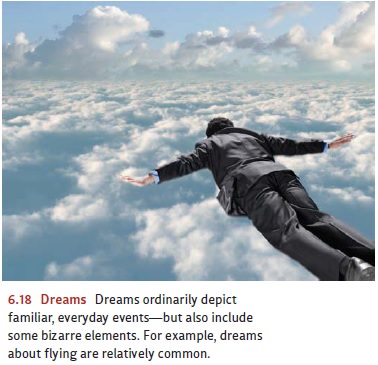Chapter: Psychology: Consciousness
Consciousness: Dreams
DREAMS
When we’re in slow-wave sleep, we
seem to be in a state of diminished awareness. We’re certainly not oblivious to
the world around us, and stimuli such as loud noises, a firm shaking, or a
bright light in our eyes will awaken us. Less intense but meaningful stimuli
can also wake us up; the classic example is a mother awakening when she hears
her baby cry. Even if we don’t wake up, we remain sensitive to some aspects of
our environment. Notice, for example, that even though we roll around while
sleeping, we manage not to roll out of bed—and so apparently we’re somehow
sensitive to how close we are to the mattress edges!
There is, however, a part of the
sleep state in which we seem acutely aware—but we are aware of events on an
internal stage, rather than events from the outside world. We’re referring, of
course, to dreams. Dreaming is
strongly associated with REM sleep, and when people are awakened from this
stage of sleep, at least 80% (and in some studies more) report that they were
just dreaming (e.g., Dement, 1978; Foulkes, 1985). This is true even of
participants who claim they have “never dreamed.” Apparently these people do
dream, even if they typically don’t recall their dreams when they wake up.
Plainly, dreaming is strongly
associated with REM sleep, but it also seems to occur in other sleep stages. If
people are awakened from slow-wave sleep, about half of them report that they
had just been dreaming. In talking about these dreams, people use different
terms than they do when reporting the dreams associated with REM sleep. The REM
sleep reports tend to be pictorial, depicting episodes that include the dreamer
as a character and that seem more or less real while the dream is under way. In
contrast, when awakened from slow-wave sleep, people tend to give only sparse
summaries, noting that they were only “thinking about something” or that their
dreams were “boring.” They rarely relate the kind of colorful, event-filled
drama we usually think of as a dream (Armitage, Hoffmann, & Moffitt, 1992;
Cartwright, 1977; Foulkes, 1985).
Does this mean that we actually
dream differently in REM sleep than in slow-wave sleep? It’s hard to decide,
because participants awakened from slow-wave sleep tend to be sluggish and
disoriented while those awakened from REM sleep are quickly alert. So it’s at
least possible that the different kinds of dream reports are reflecting the
different states of the just-awakened sleepers rather than the nature of the
dreaming itself.
Focusing just on REM dreams,
though, what do people dream about (Figure 6.18)? Our evidence comes from the dream reports of just-awakened dreamers.
The contents of these reports vary enor-mously, but make it clear that events
in dreams do not—as some

people suppose—flash
instantaneously before the dreamer. Instead, events in dreams seem to take
about as long as they would in real life. We know this because, when people
awake from dreams, we can ask them, as part of their dream report, to estimate
how long they had just been dreaming. These estimates tend to be quite
accurate— and so someone who recalls, say, 5 minutes of a dream is likely to
have just spent 5 minutes in REM sleep; someone who recalls 15 minutes of dream
content is likely to have just spent 15 minutes in REM, and so on (Dement &
Kleitman, 1957; Dement & Wolpert, 1958).
Dream reports also indicate that
dreams tend to showcase a range of relatively ordinary current life
preoccupations—including the emotional events of life but also the mundane
episodes of one’s daily routine (Cartwright, 1994). Dreams likewise tend to
include familiar places and objects, people we’ve recently encountered, or
activities we have recently engaged in—including, of course, activities that
filled the hours just before sleep. In one study, researchers had people spend
several hours playing Tetris before going to bed; many of the participants
reported dreaming about blocks falling and rotating, just as they do in the
game. It’s worth noting, though, that the participants in this study rarely
reported dreams about playing the Tetris game itself (Stickgold et al., 2000).
Dreams are not, however, mere
replays of daily events. Instead, our dreams often introduce weird or illogical
elements. Thus we might dream about being naked in pub-lic places, or about
flying—without, of course, the aid of an airplane. Despite these peculiar
features, though, the dream content seems perfectly natural while it’s under
way; it’s only when we’re awake that the dream seems strange.
In addition, people’s dreams tend
to reveal similar themes from year to year, even over decades (Domhoff, 1996).
Some people regularly dream about illness, others dream about fighting, and
others dream about romance. But some themes show up in nearly everyone’s
dreams. For example, for almost everybody, dreams contain bad outcomes more
often than good ones, and more negative emotions (fear, worry, embar-rassment)
than positive ones. Thus, people dream about failed efforts, missing
appointments (or exams), or being attacked or chased. Dreams also seem to
include more aggressive interactions than friendly ones. In fact, according to
one estimate, 2 out of every 100 dream characters are murdered—a proportion far
exceeding real-life homicide rates (Hall & Van de Castle, 1966; Hall et
al., 1982).
There are also certain themes that
are relatively rare in dreams—and perhaps sur-prisingly so. For example,
relatively few of our dreams have detectable sexual content (Domhoff,
2003)—only 10% of the dreams reported by young men and roughly 3% of the dreams
reported by women. (But for both males and females, and largely independent of
reported dream content, REM sleep is associated with genital arousal—erections
in males and vaginal lubrication in females.) However, when we do dream about
sexuality, the sex acts are often quite overt—and so the dreamer, the next
morning, recalls a dream about wild and passionate intercourse.
Related Topics